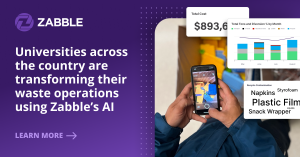
Leading Universities Harness the Zabble Zero™ Platform to Intelligently Track Waste Data from Disposal to Hauling
Learn how universities are harnessing the AI-powered Zabble Zero™ platform to intelligently track data from disposal to hauling for efficient waste operations.
WALNUT CREEK, CA, UNITED STATES, June 30, 2025 /EINPresswire.com/ -- Zabble, a leading provider of AI-powered zero waste technology solutions for businesses and cities, today shares how leading universities are harnessing Zabble Zero™ to intelligently track waste data granularly from the point of disposal to hauling for effective waste operations.
California State University, Northridge (CSUN), Georgia State University (GSU), Stanford University, University of California, San Francisco (UCSF) and State University of New York, College of Environmental Science and Forestry, among many others, are the latest to renew their partnership with Zabble to use their artificial intelligence (AI) platform to digitize their hauling and collection logistics across campus and inventorize bins by location, size and type, whether inside the building, in the loading docks, enclosures or on campus. The solution empowers waste leaders to close the loop between their zero waste plans and actions being taken.
For example, USCF, a research and academic university spanning three campuses with 80 buildings, was looking to unlock new opportunities for targeted outreach for contamination reduction. Assistant Director of Recycling & Waste Reduction Daniel Chau implemented Zabble's Mobile Tagging™ platform, where patented computer vision AI enables his team to streamline data collection, gaining visibility into waste streams, generation, and disposal patterns–including fullness and contamination per building, floor and bin.
For bulkier e-waste, Chau and his team conduct investigations using Zabble to trace each item back to a lab or department and, from that origination point, deliver personalized education and training. Over time, e-waste contamination alert volumes shrunk by 40 percent in the waste stream, avoiding fines and improving downstream environmental impact.
Chau and his team also monitor contamination levels across all university labs so they stay as low as possible, typically between two and five percent, before sending the nearly contamination-free plastics to their partner for cleaning and recycling, who then return them to UCSF labs for reuse–a fully closed loop system.
“Zabble’s data is invaluable in how we move forward with increasing our waste diversion, reducing our overall waste footprint, and recycling and reducing as much as possible—for our staff and students today—as well as future generations,” said Daniel Chau, Assistant Director of Recycling & Waste Reduction at UCSF.
Other universities enable and empower their campus hauling team to leverage the Zabble Mobile Tagging platform to collect dumpster fullness and contamination data at pickup, driving visibility across all campus stakeholders to build effective zero waste programs together—from planning service levels to bin operations to contamination reduction campaigns.
Georgia State has been primarily focused on using Zabble’s Invoice Analytics offering where document processing AI processes and organizes hauler invoices to analyze waste streams, service levels and costs by location. GSU receives monthly anomaly reports detecting billing irregularities and optimization opportunities—leading to significant cost savings. Invoice Analytics also delivers insights on campus waste generation, diversion, pickup frequencies, and environmental impact across service locations and waste streams, facilitating immediate issue resolution with haulers and vendors.
“By partnering with Zabble, Georgia State University has been able to not only optimize our waste management operations but also reinforce our commitment to sustainability and fiscal responsibility,” said Jennifer Wilson, Director of Sustainability Initiatives at Georgia State University.
At UCSF, anomaly detection helps save nearly 92 percent of the team’s time and associated staffing costs—12 times faster than previous spreadsheet-only analysis methods. With a holistic approach to waste cost savings and resource planning, UCSF sees a 2X return on their investment into the Zabble platform.
“Zabble’s innovative technology is not just about managing waste; it’s about transforming the way we approach sustainability,” said Nik Balachandran, Founder & CEO of Zabble. “Our AI-powered solutions empower some of the nation’s leading universities to make smarter, data-driven operational decisions that drive tangible, measurable results.”
Zabble invites universities who wish to digitize their campus waste streams end-to-end, bring all campus stakeholders on the same page, and leverage AI to boost waste operational efficiency to reach out to Zabble for a demo and consultation.
Nikhil Balachandran
Zabble Inc.
+1 925-289-9345
team@zabbleinc.com
Distribution channels: Waste Management
Legal Disclaimer:
EIN Presswire provides this news content "as is" without warranty of any kind. We do not accept any responsibility or liability for the accuracy, content, images, videos, licenses, completeness, legality, or reliability of the information contained in this article. If you have any complaints or copyright issues related to this article, kindly contact the author above.
Submit your press release
